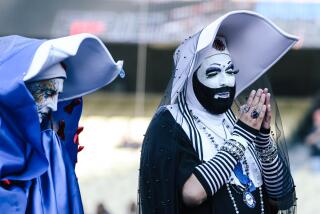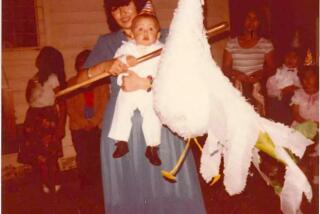PRIVATE FACES, PUBLIC PLACES : A Heart to Hold Other People’s Stories
Sister Felice Marie is a nun. She goes to the hairdresser, wears jewel-colored clothes from cut-price stores and drives a sensible car a little too fast. When she joined the Sisters of the Holy Names of Jesus and Mary, she wore a long holy habit of Belgian serge, sewn, washed, reworked by herself. Her life was ordered by others and provided for by others. That was 40 years ago; she lives in a convent still, but these are times and Sister Felice Marie has to find her own work. Her order is weighted with elderly nuns. “Those who are able to get out are expected to find a salary,” as she puts it.
She taught English for many years, until the order sent her to Stanford to take a master’s in speech pathology. She holds two jobs now, one working with the deaf; long, patient, kind hours.
She walks with a crutch and makes light of it, her painful, shuffling gait, her history of surgery and suffering. She talks instead of how brave are her “patients,” how hard their afflictions.
Every Thursday evening, she drives to her other job, to Beverly Hills High School, to teach an adult class in life-story writing. The classroom is hung with the triumphs of those about to embark on life. The evening group is older, darker, women mostly, trying to make sense of the years since. Widows, wives, mothers, bookkeepers, aides: defined always in relation to others, trying here to record their own part, to write themselves out of the shadows. The widow whose husband drank, the mother whose son died, the wife who survived two aneurysms and wants her children to know her better while there is still time--to know what went before them, when she was someone’s child.
Newcomers miss the references to “Sister Felice”; it takes a while to see beyond her bird-like ways, to notice her keen eyes, the spirit within. “The first night, I’m just a normal person, but someone will soon creep up and say ‘Are you a nun?’ and I can feel them looking at me differently. The habit has gone but nothing changes, really. Nothing inside changes.”
It is not a distinguished gathering; more dramatic or confident people, perhaps, take too much pride in their lives to want to give away small parts of them. The retired pharmacist writes of being sent away from his home in Hitler’s Germany, of the only time his father kissed him as he said goodby. The Irish nursery school teacher, who followed her husband’s job, remembers a skirt that she sewed and gave to her successor--a huge skirt to comfort, to hold onto, to be wrapped in and hidden.
The woman whose son died writes of herself only in the third person--the Mother. And as she finishes reading her story of the son’s dying, the class has a stillness. It is Sister Felice who reaches out, tears in her eyes, and, hardly moving, brings comfort.
“Oh, I do look forward to my Thursday nights,” says Sister Felice, “I can hardly wait to get here. Some people have been deeply wounded--husbands lost, financial reversals, family illnesses. But if a person needs support and has nowhere to reach for it--how thrilled I am to be there.”
She joins her students for coffee, goes to their homes for dinner. She spends hours setting their stories on a computer, helping them to find binders, printers--to make a record of their existence. And if she ever sees the contrast between their lives and hers, she brushes it aside.
It was her mother’s joy to “lose” a son to the Jesuits, two daughters to the Sisters. “She was thrilled to death that we had the gift of faith.” And she who seemed once to be depriving herself of a full life--family, children, control--finds herself now with the fullest of lives. She lives with others, cares for them, is cared for--is centered by faith, and consoled by it. Whose life, one wonders, has been the emptier?
More to Read
Sign up for Essential California
The most important California stories and recommendations in your inbox every morning.
You may occasionally receive promotional content from the Los Angeles Times.










